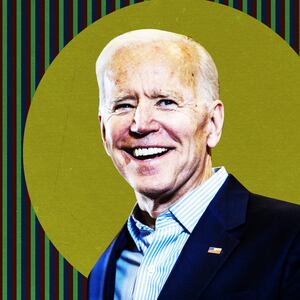Watching two basically credible, sane people debate American politics on Sunday night, it hit me hard how unpresidential the scene is in the White House now.
Before the coronavirus, he was an unserious leader for an unserious country. But despite his penchant for chaos, there was at least a sense that Donald Trump had dumb luck on his side. Absent the luck, we are now left with just the dumb.
He is a Homer Simpson president in what is, increasingly, a Frank Grimes world.
ADVERTISEMENT
Meanwhile, instead of telling people why they are more serious, Democrats are showing them.
By virtue of the field winnowing down to just two old pols—and by virtue of the coronavirus relegating the debate to a TV studio, without those applauding crowds—Joe Biden and Bernie Sanders were given the perfect debate platform on Sunday night to demonstrate gravitas.
They did not fail. It wasn’t Lincoln-Douglas, but it also wasn’t Tyson-Douglas, which is what a lot of modern TV debates are set up to produce.
Between the favorable stage format and the seriousness of this moment, the debate hearkened back to a bygone era. (No, I’m not talking about a hundred years ago. Twenty years feels like a lifetime. It reminded me of those debates between vice presidential candidates like Dick Cheney and Joe Lieberman. Even if the politics were somewhat more radical, the aesthetics were pure nostalgia.)
While the Democrats are looking like the experienced, sober, adults, Trump cannot capitalize on the power of incumbency because he cannot take advantage of the serious prestige of the presidency.
Countless examples of Trumpian misinformation, mistakes, and pettiness dot the political landscape, creating a sense that this presidency, once seemingly destined for eight years, might effectively end in eight months. There is a sense that a time of peril might call for serious leaders. And Donald Trump doesn’t do serious.
Despite the trappings of the Oval Office or the Rose Garden, his inveterate penchant for (at best) premature optimism (“it will all work out well”), coupled with his inability to refrain from political attacks (see “Cryin’ Chuck Schumer) mean that the president is being out-presidentialed during a moment of crisis.
Another observation: Before the pandemic, Trump got away with presenting vague, if conflicting, narratives that allowed him to be all things to all people. If you wanted to believe that he was an outsider, you could--despite the fact that he was also the most powerful man in the world. It might have taken a healthy dose of cognitive dissonance, but Trump was poised to pull off being an incumbent president who could run for re-election as an outsider.
The only problem? During times of national crisis, we want to believe that the president is in charge. Trump’s strongman persona has always been tempered by a lack of competence. In this instance, he might have been better served by embracing his authoritarian tendencies and aggressively tackling this pandemic from the start. Instead, after shutting down travel from China, he’s sounded more like a salesman than a strongman.
For the first time, it’s not even entirely clear how to propagandize for him. Which alternate reality should he push? Trump’s “brain trust”—the right-wing pundits and talkers who have unwaveringly supported him—are torn over the seriousness of the coronavirus epidemic, not knowing whether to cast it as a “deep state” media hoax or embrace it as a would-be armageddon that China (or George Soros) created in their basement, before unleashing on the United States.
Meanwhile, Biden and Sanders stood for two hours on Sunday night, debating serious ideas and solutions.
Bernie (and his supporters) were afforded a platform to advance his radical ideas, and Biden (who made news by announcing he would select a female running mate), is clearly making an attempt to incorporate Bernie’s progressives into his coalition.
Rather than chaos and confusion, the message seems to be seriousness and unity.
This is not merely a contrast with Trump, but with where the Democratic party had been. Less than three weeks ago, seven candidates held a bombastic debate in South Carolina. They played the game—and played to the crowd in the hall.
Much has changed since then. They quit playing to the crowd just as the president was losing his.
The “Let Trump be Trump” mantra never seemed more dangerous.






